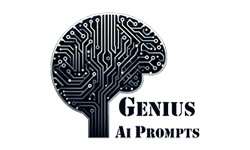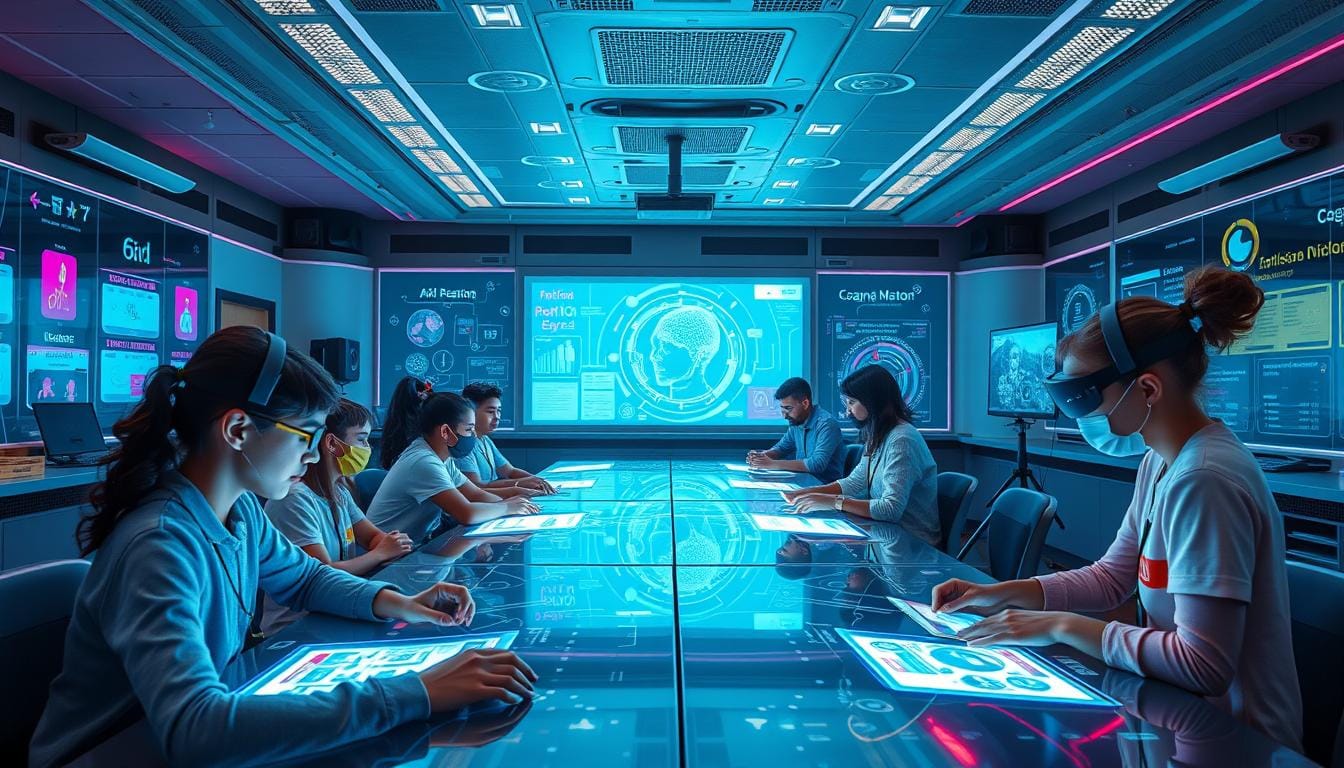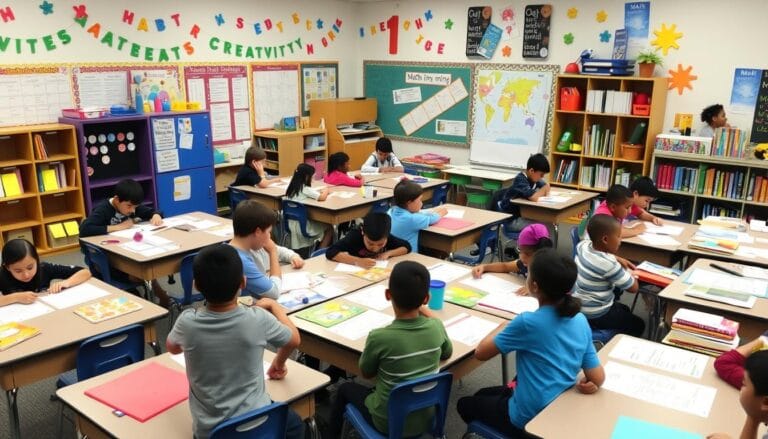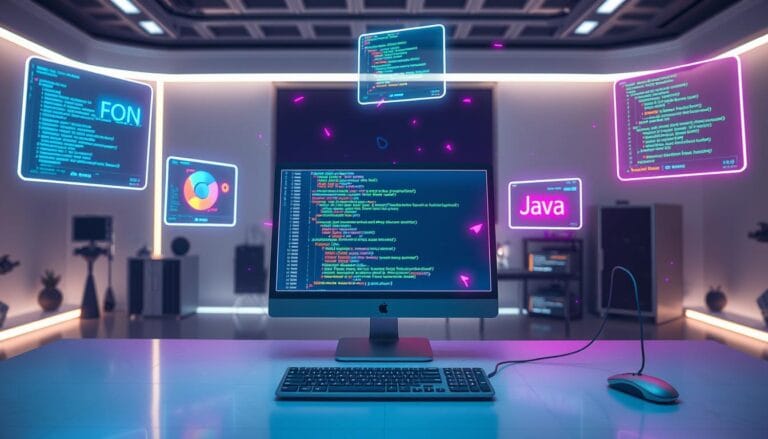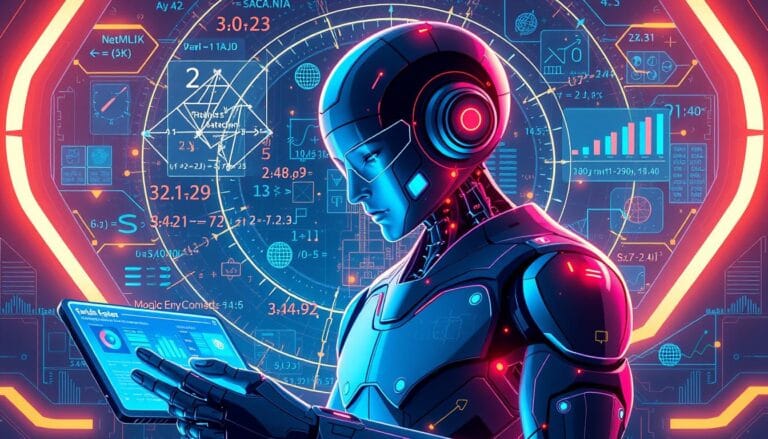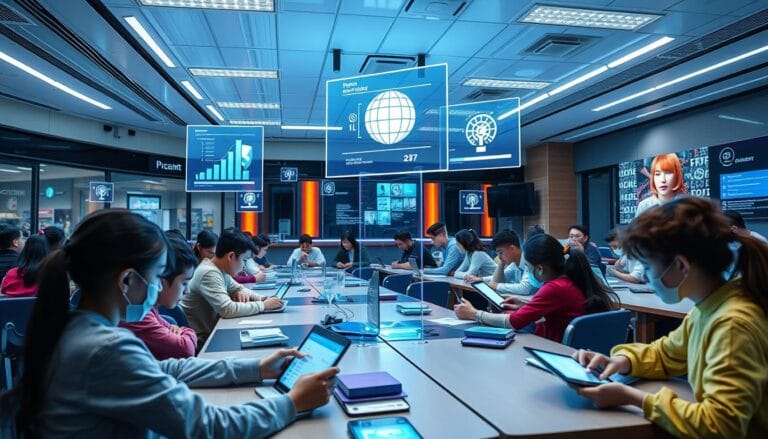10 Genius AI Prompts to Revolutionize Online Learning in 2025
As an educator, I’ve seen how technology changes the classroom. Tools like interactive whiteboards and virtual field trips have made learning more engaging. Now, AI is set to change online learning even more.
Thank you for reading this post, don't forget to subscribe!AI prompts will make learning more personal and interactive. They will help teachers and make learning more efficient. Imagine AI creating lesson plans and giving feedback in real-time, making learning fun and effective.
We’re on the edge of a big change with AI in education. Let’s explore how AI will change online learning. We’ll look at ai prompts for online learning, revolutionize online education 2025, ai in e-learning 2025, and the future of online learning with ai.
Table of Contents
Key Takeaways
- AI-powered tools are revolutionizing content creation and productivity in online learning
- Effective AI prompts can save time and money by delivering accurate and contextually relevant responses
- AI prompts in 2025 will cover a wide range of educational tasks, from lesson planning to interactive materials creation
- Personalized learning experiences and real-time feedback will be driven by AI-powered algorithms and adaptive technologies
- The integration of AI, virtual reality, and other emerging technologies will transform the future of online education
Understanding the Evolution of AI in Education Technology
The world of education is changing fast, thanks to AI. AI-driven education tools are getting better, offering learning experiences tailored to each student. By 2025, AI will change how we teach and learn a lot.
Current State of AI-Powered Learning Platforms
Today, AI-powered learning platforms are changing how students learn. These platforms use AI to find out what each student needs to learn. They adjust the lessons to fit each student’s abilities, making learning more fun and effective.
Impact of AI on Traditional Educational Methods
AI is changing education in many ways, not just through learning platforms. Automated grading systems give students quick feedback. Virtual tutors help students one-on-one. These changes make learning easier and give teachers more time to connect with students.
Key Educational Technology Trends for 2025
Looking ahead to 2025, education will keep getting better with new tech. Large language models like ChatGPT will help students talk to learning materials in a more natural way. AI and virtual reality will also make learning more real and exciting.
AI will also help with assessment tools, giving feedback and tracking student progress. This will help teachers tailor their lessons to each student. These tech advancements will prepare students for the digital world ahead.
AI Prompts for Online Learning: Essential Tools for Modern Education
Online learning is changing fast, and AI prompts are key to better student engagement and results. These prompts make digital learning more interactive and tailored to each student. They help create a more personal learning experience.
By 2025, AI prompts will get even better. They will understand and answer complex questions thanks to natural language processing. This means learning will be more personal and effective for everyone.
AI-driven courses will use prompts to make learning content just for you. They will adjust the speed and difficulty of lessons and give feedback right away. This helps students learn at their own pace and understand better.
AI prompts will also make quizzes and tests more interactive. They will give instant grades and tips for getting better. This feedback helps students know their strengths and work on their weaknesses.
The future of online learning is bright with AI-powered learning techniques and AI prompts for better learning. These tools will help students succeed and be ready for the 21st century.
“Incorporating creativity into learning experiences leads to the addition of interactive elements and transforms the way learners engage, think, and apply knowledge.”
The future of online learning is bright with AI prompts. They will change education and help students achieve great things.
Transforming Student Engagement Through AI-Driven Personalization
The future of online learning in 2025 will see a big change. AI will make learning more personal and engaging. Courses will be adjusted to fit each student’s needs, helping them learn better.
Adaptive Learning Algorithms in Action
AI will change how students learn by adjusting content on the fly. It will make sure students learn at their own speed. This has already helped students in math, making them 20% better.
Creating Interactive Learning Experiences
Teachers will use AI to make learning fun and interactive. They’ll create games, simulations, and virtual reality. This will make students more excited to learn and understand complex topics better.
Real-time Student Progress Tracking
AI will help teachers keep track of how students are doing. It will spot where students need help right away. This has cut down student dropouts by 90% in some courses.
AI will change how students learn online, making it more personal and effective. As e-learning trends 2025 grow, AI will play a big role. It will help make learning better and more efficient.
Leveraging ChatGPT and Large Language Models in Education
The way we teach and learn online is changing fast. Advanced AI, like ChatGPT, is set to make a big impact by 2025. These tools can change how we create courses, help students one-on-one, and make learning better.
ChatGPT, made by OpenAI, is changing education. It can make lesson plans more fun and answer students’ questions quickly. By using these tools in online classes, teachers can meet different learning needs, making education better than ever.
But AI does more than just help with lessons and answers. It can also make practice tests and check-ups. This means learning can be more personal and effective. Teachers using AI can make learning more fun, track progress, and give feedback that really helps, shaping the future of online education.
| Metric | Value |
|---|---|
| Class Central rating | 4.9 out of 5 (based on 30 ratings) |
| ChatGPT active users | 100 million within two months of release |
| ChatGPT performance in law school exams | Passed 4 exams at the University of Minnesota Law School |
Using ChatGPT and similar tools in schools is exciting but also raises big questions. Teachers and schools must use these tools wisely, avoiding cheating and making sure they help students learn. Talking about how to use AI in schools is key to making sure it improves education.
“The integration of ChatGPT and large language models into learning management systems will enable more personalized and adaptive learning experiences, catering to diverse learning styles and needs.”
As education keeps changing, using AI smartly will be crucial. It will help make online teaching and learning better and more effective.
AI-Powered Assessment and Feedback Mechanisms
The eLearning world is changing fast, thanks to AI. By 2025, AI will change how we evaluate learning. Old ways can’t keep up with today’s digital world. But AI is making things faster, better, and more tailored for each learner.
Automated Grading Systems
AI is making grading systems that work fast and fair. These systems use smart tech like NLP and ML to check student work. This lets teachers focus on teaching, knowing students are getting fair grades.
Personalized Feedback Generation
AI is changing how we give feedback to students. It uses smart algorithms to give feedback that’s just right for each student. This feedback helps students learn faster and feel more confident.
Performance Analytics and Insights
AI is making learning data more useful. It helps teachers and students see how they’re doing and where they can get better. This helps everyone learn better and faster.
As AI gets better at helping with learning, we must make sure it’s fair and keeps data safe. By using AI and human skills together, we’ll see better learning experiences. This will make learning more fun and effective for everyone.
“The future of education lies in the seamless integration of AI-driven assessment and feedback mechanisms, empowering both educators and students to achieve their full potential.”
Enhancing Course Creation with AI Teaching Assistants
AI technology is changing how teachers create courses. By 2025, AI teaching assistants will be key in making courses. They will help teachers focus on the important parts of teaching.
These tools will help teachers make engaging courses and content. They will also make interactive tests for different learning styles. AI to boost online education and ai technology in online learning will make learning better.
AI teaching assistants can make study guides and practice exercises. Best ai prompts for learning help them find the right resources. This makes learning more complete and interesting for students.
Also, ai-driven learning strategies help AI teaching assistants understand student data. This gives teachers insights to improve teaching. It helps students learn better.
AI teaching assistants are becoming more important in making courses. They help teachers by doing routine tasks. This lets teachers focus on making learning exciting and effective.
| AI Feature | Benefit |
|---|---|
| Automated Lesson Planning | Efficient and personalized lesson plans that captivate students |
| SMART Objective Generation | Structured learning goals aligned with Bloom’s Taxonomy |
| AI-Driven Course Outlines | Cohesive roadmaps for lessons, improving learning outcomes |
| AI-Assisted Content Curation | Reduced time spent on finding and creating engaging materials |
| Personalized Teaching Strategies | Recommendations based on student data and engagement patterns |
AI teaching assistants are changing online learning. They help teachers make learning better. This technology opens up new ways to teach students in a personal and engaging way.
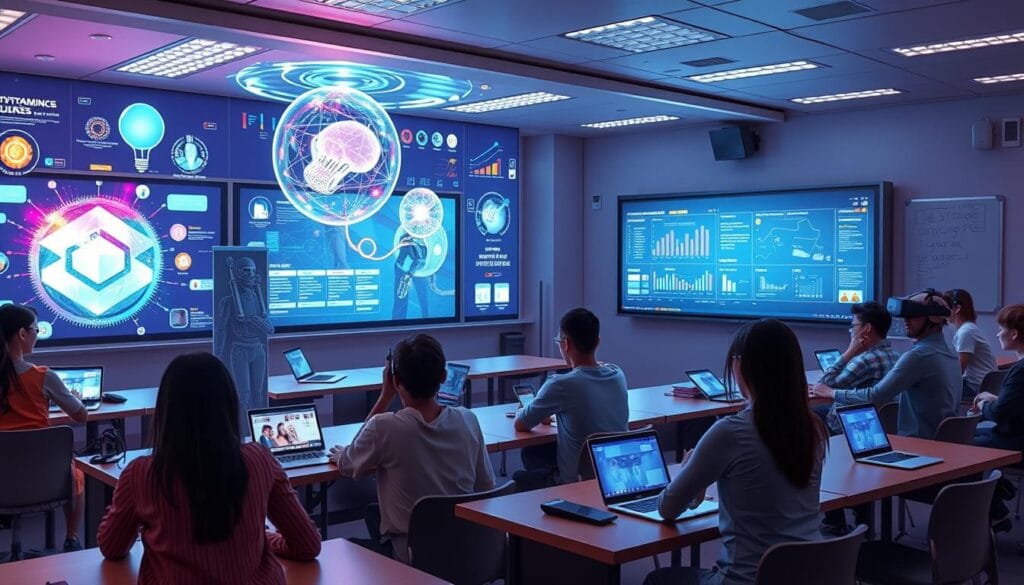
Building Inclusive Learning Environments Through AI Technology
As we look towards 2025, AI is changing how we make learning spaces for everyone. It’s making learning more accessible and breaking down language barriers. This means all students can do well in school.
Accessibility Features for Diverse Learners
AI tools are making learning better for students with different needs. They offer real-time captions, text-to-speech, and easy-to-use interfaces. AI tools to improve education help make sure all students get a fair chance to learn.
Language Support and Translation Tools
Our classrooms are getting more global, and AI for adaptive learning is helping. It’s making it easier for students who speak different languages to understand school materials. AI helps teachers make learning materials in many languages, creating a welcoming classroom.
Adaptive Content Delivery Systems
By 2025, AI in classroom tech 2025 will change how we share educational content. It will adjust the content to fit each student’s needs. This way, every student can learn in a way that works best for them.
As we move towards a future with AI for e-learning personalization, these technologies will make learning better for everyone. By using AI, teachers can help all students succeed in their studies.
Integration of Virtual Reality and AI for Immersive Learning
By 2025, virtual reality (VR) and artificial intelligence (AI) will change online learning. These technologies will make learning fun and personal. They will help students understand complex subjects better.
AI will create realistic VR worlds for subjects like history and science. Students can explore and interact with these worlds. The learning experience will fit each student’s needs and goals.
For instance, a history student can walk through a virtual ancient Greek city. They can talk to virtual characters and see the city up close. AI will watch how they do and make the experience better for them.
In a virtual chemistry lab, students can do experiments safely. AI will check their work and give feedback. This helps them learn science better.
VR and AI together will make learning more fun and effective. Students will get to apply what they learn in real ways. This new way of learning will open up new possibilities for students.
| Metric | Findings |
|---|---|
| Participant Engagement | High personalization increased engagement by 64.1% over no personalization (p |
| Personalization Levels Evaluated | High, Moderate, and No personalization |
| Eye-tracking Metrics | Fixation duration, saccade duration, and pupil diameter |
| Predictors of Gameplay Duration | Specific eye-tracking metrics significantly predict gameplay duration |
The future of future learning with ai prompts, revolutionizing teaching with ai, ai learning assistants 2025, and ai-powered learning techniques is exciting. VR and AI will change education. They will make learning fun and personal for everyone.
Conclusion: The Future of AI-Enhanced Online Education
The future of online education with AI in 2025 looks very promising. AI prompts will play a big role in making learning more personal and interactive. Large language models and AI teaching assistants will help both teachers and students a lot.
AI will make learning more accessible and engaging for everyone. But, we must also think about the ethics of using AI in schools. This is important as AI becomes more common in education.
A study showed how AI can affect learning. Students who used ChatGPT did better on practice problems, scoring 48% higher. But, those who used a ChatGPT tutor with hints did even better, scoring 127% higher than usual methods.
However, regular ChatGPT users did 17% worse on tests than those who used traditional resources. This shows there might be a trade-off in learning outcomes.
But, students who used the ChatGPT tutor with hints did just as well on tests as those who used traditional methods. This suggests AI could be helpful in improving learning. We need to make AI tools better to encourage critical thinking and active learning. This will help improve learning results overall.
